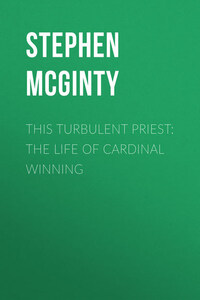If ever an incident encapsulated the character of Cardinal Thomas Joseph Winning, it was a meeting with Derry Irvine, the Lord Chancellor. The Archbishop of Glasgow had travelled to London in 1999 to meet Britainâs most powerful lawmaker, in order to raise concerns over the issue of bioethics. After a long wait in the outer chambers of the Lord Chancellorâs office at the House of Lords, the Cardinal spotted Irvine striding towards him, woollen wig flowing, ruffled shirt tucked in place, breeches and silk stockings meeting neatly at the knee, and patent leather shoes buffed to a brilliant shine, offset by silver buckles. As Irvine breezed past, offering the Cardinal the briefest of nods, Winning nudged Ronnie Convery, his current affairs adviser, and said: âIf thatâs the Lord Chancellor, can you imagine what God looks like?â
So much of this anecdote gives a flavour of the man: he was a humorist who pricked pomposity with wit, he was an outsider, suspicious of the corridors of power, and he was a critic of the government, whether it came wrapped in the blue ribbon of the Conservative Party or wore the red rose of New Labour. As a Prince of the Church, Winning possessed a wardrobe of scarlet robes and red birettas capable of matching the Lord Chancellor stitch for embroidered stitch, but instead he preferred the anonymity of a dark suit and white collar, the garb of a common priest. Derry Irvine famously proclaimed himself in the mould of Cardinal Thomas Wolsey, the Lord Chancellor under Henry VIII, whose power and pomp in the early sixteenth century was legendary. Winning, in comparison, was closer to St Thomas à Becket â âthis turbulent priestâ, as Henry II christened his Archbishop of Canterbury, so painful had he become to the government of the day.
Yet Cardinal Winning was no saint. He could be arrogant, a bully and a sexist. He disliked homosexuals, distrusted many politicians, and considered Donald Dewar, then First Minister of Scotland and âFather of the nationâ, a âbigotâ â a charge to which he himself lay open. In financial matters, he was at best woefully uninterested, and at worst incompetent, and his tenure as Archbishop of Glasgow coincided with the creation of a £10 million debt that almost bankrupted the diocese. On the flip side of the coin, he was warm and personable. He cared deeply for his priests and his people and, throughout his career, he fought both poverty and social injustice. In a secular age, he managed to make the Church relevant. He battled against Prime Minister Tony Blair over the issue of abortion and startled the country by offering money to women in crisis pregnancies. This is the story of a minerâs son, raised in a crucible of anti-Catholicism, who went on to become arguably the most powerful religious leader of his day in Britain.
I was a six-week-old infant cradled in my motherâs arms when I first met Thomas Joseph Winning. He was then an auxiliary bishop in the archdiocese of Glasgow who had been sent, against his will, to the parish of Our Holy Redeemer in my hometown of Clydebank, the shipyard town that bequeathed the world the Singer sewing machine and the QE2. A reluctant parish priest, he appeared to spread the misery around by decreeing that all baptisms be carried out before nine oâclock Mass on a Sunday morning. I was born in the January of a bitter winter and my mother feared I would catch pneumonia if brought out at such an early hour. Winning never actually baptised me â he was too busy fighting a turf war with his fellow auxiliary bishop â but he did peer into my swaddling clothes and I repaid his interest by praying for him every Sunday until the day he died.
It was customary during the Eucharistic prayer of the Mass for Catholics in Glasgow to pray âfor our bishop Thomasâ, but I was unaware of him as public figure, looming larger than his five feet six inches. Later, as an altar boy, I served at Masses at which he concelebrated. My interest in him deepened once I had exchanged the soutane of an altar boy for a journalistâs mackintosh. I literally bumped into him on the Glasgow-Edinburgh train shortly after he had received the red hat of a cardinal, and I was surprised that he was travelling alone, without a bag carrier or assistant. We chatted for an hour and I marvelled at his approachability.








